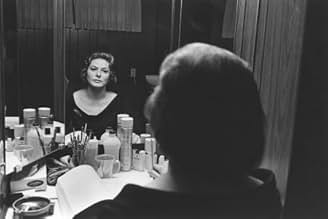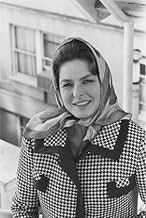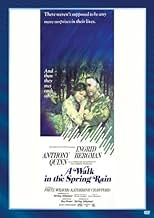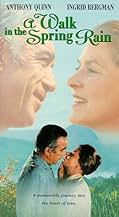Agrega una trama en tu idiomaThe Merediths move to an isolated farm. Mrs. Meredith and the neighbour Will Cade become friends and anticipate becoming lovers.The Merediths move to an isolated farm. Mrs. Meredith and the neighbour Will Cade become friends and anticipate becoming lovers.The Merediths move to an isolated farm. Mrs. Meredith and the neighbour Will Cade become friends and anticipate becoming lovers.
- Dirección
- Guionistas
- Elenco
Tom Holland
- Boy
- (as Tom Fielding)
Michael Bullock
- One of men in fight crowd
- (sin créditos)
- Dirección
- Guionistas
- Todo el elenco y el equipo
- Producción, taquilla y más en IMDbPro
Opiniones destacadas
Libby Meredith (Ingrid Bergman) is the dutiful wife of college professor Roger Meredith. They are traditional and do not approve of their daughter's personal pursuit away from her family obligations. Roger is on sabbatical writing a book. The couple leaves New York City for the country where Libby finds flirtatious neighbor Will Cade (Anthony Quinn).
There is a promise of an epic romance. It has the great pairing of Bergman and Quinn. It should be incredible. Libby as a conservative matriarch is set up to join the sexual revolution. I like the conflict between mother and daughter. I don't buy Anthony Quinn as an American, let alone a southerner. This should be a battle for Libby's heart and mind by the two men. There is a sudden twist that short-circuits the confrontation. In short, I don't like the twist which comes out of nowhere. Otherwise, the two leads and the premise provide interesting viewing.
There is a promise of an epic romance. It has the great pairing of Bergman and Quinn. It should be incredible. Libby as a conservative matriarch is set up to join the sexual revolution. I like the conflict between mother and daughter. I don't buy Anthony Quinn as an American, let alone a southerner. This should be a battle for Libby's heart and mind by the two men. There is a sudden twist that short-circuits the confrontation. In short, I don't like the twist which comes out of nowhere. Otherwise, the two leads and the premise provide interesting viewing.
This is a bittersweet tale of two people from different worlds who fall in love and are unhappily married to others. Ingrid Bergman and Anthony Quinn make this story poignant, well-acted and believable.
It's love at first sight for Quinn as he comes out the box, swinging and pitching in his attraction for her. Honestly, it's just a little unsettling him always popping up, being a corn-pone chatterbox, subtly moving in with the compliments and lingering looks. He comes out the gate heated; but who can blame him. It's Ingrid Bergman he's fancying. And she slowly simmers as her attraction grows for the Tennessee mountain man Quinn plays. She's the wife of a University professor ( Fritz Weaver. ) Nice guy, good provider, but you know the type: he's no ogre, but he's staid, pedantic, and definitely not romantic. As she is throughout her career in films, Bergman is the one to watch. Her characters are so full of life if only allowed to break free.
You know how unfair, biased, skewed and stark movies present choices when they pit Marriage vs the Love Affair. We've seen it time and time again ( "The Arnelo Affair", "There's Always Tomorrow", etc. ) Well this movie is no different. Quinn's wife (played by Virginia Gregg ) is as drab and as sexless as Bergman is glamorous and sensual. It's difficult to conjure up why there was even an attraction between them ( Quinn & Gregg ) in the first place. Fritz Weaver's character fares no better. Apparently he doesn't realize what we all know very well from watching movies; when a spouse says: "let's go away, just the two of us" your marriage is on the rocks. Yet Weaver is clueless. Him throwing up their age as a deterrent to living more spontaneously is also a fly in the liniment.
The movie throws in an unnecessary monkey wrench with the issues of the son and daughter of Quinn's and Bergman's in order to create conflict. I do like how Bergman stands up to her daughter in order to try and get some piece of happiness and joy out of life instead of maternal duty. No, we didn't need the kids in this to get conflict. The story should have stayed focused on how Bergman and Quinn handle their situation.
It's love at first sight for Quinn as he comes out the box, swinging and pitching in his attraction for her. Honestly, it's just a little unsettling him always popping up, being a corn-pone chatterbox, subtly moving in with the compliments and lingering looks. He comes out the gate heated; but who can blame him. It's Ingrid Bergman he's fancying. And she slowly simmers as her attraction grows for the Tennessee mountain man Quinn plays. She's the wife of a University professor ( Fritz Weaver. ) Nice guy, good provider, but you know the type: he's no ogre, but he's staid, pedantic, and definitely not romantic. As she is throughout her career in films, Bergman is the one to watch. Her characters are so full of life if only allowed to break free.
You know how unfair, biased, skewed and stark movies present choices when they pit Marriage vs the Love Affair. We've seen it time and time again ( "The Arnelo Affair", "There's Always Tomorrow", etc. ) Well this movie is no different. Quinn's wife (played by Virginia Gregg ) is as drab and as sexless as Bergman is glamorous and sensual. It's difficult to conjure up why there was even an attraction between them ( Quinn & Gregg ) in the first place. Fritz Weaver's character fares no better. Apparently he doesn't realize what we all know very well from watching movies; when a spouse says: "let's go away, just the two of us" your marriage is on the rocks. Yet Weaver is clueless. Him throwing up their age as a deterrent to living more spontaneously is also a fly in the liniment.
The movie throws in an unnecessary monkey wrench with the issues of the son and daughter of Quinn's and Bergman's in order to create conflict. I do like how Bergman stands up to her daughter in order to try and get some piece of happiness and joy out of life instead of maternal duty. No, we didn't need the kids in this to get conflict. The story should have stayed focused on how Bergman and Quinn handle their situation.
First review above slams the people of the hills of Tennessee, assuming that they are backward, in-bred people. It's too late now, but I would have objected strenuously to that misguided garbage. The reviewer probably never met a real hillbilly, and no, "Deliverance" is not about real people, it's a fictional account invented in Hollywood. Please, you idiots, stop slamming mountain people. You don't even know any.
The problem I see with the movie is casting Anthony Quinn as a mountain man. I never saw any backgrounder that said he was an immigrant from Italy, Greece, or Mexico who moved to the mountains. With the character name they gave him, I assume they were seriously trying to palm Anthony off as a Tennessean. I did notice that they never actually showed his lips moving when he was delivering his lines: Anthony's accent wasn't identifiable as such, but it certainly wasn't TN mountains. I may well be missing something. But, one thing I'm not missing is the outright prejudice, and even hate, I see for the people of the mountains. Shame!
The problem I see with the movie is casting Anthony Quinn as a mountain man. I never saw any backgrounder that said he was an immigrant from Italy, Greece, or Mexico who moved to the mountains. With the character name they gave him, I assume they were seriously trying to palm Anthony off as a Tennessean. I did notice that they never actually showed his lips moving when he was delivering his lines: Anthony's accent wasn't identifiable as such, but it certainly wasn't TN mountains. I may well be missing something. But, one thing I'm not missing is the outright prejudice, and even hate, I see for the people of the mountains. Shame!
Admirers of classic films will no doubt enjoy seeing Anthony Quinn reunited with Ingrid Bergman, his co-star from 1964's "The Visit"; they're an interesting screen match, but here, in 1970, with handyman Quinn talking in a southern drawl and matronly Bergman playing a professor's wife living on a farm in Tennessee, one cannot help but feel a sense of central dislocation. Bergman's husband (American actor Fritz Weaver) takes a year off from teaching to write a textbook, but instead stares at his typewriter, pipe firmly stuck between his teeth (his wife isn't frigid, but he is). It's no wonder then that Bergman enjoys Quinn's advances, but since they're both married--and have problems with their selfish children besides--it's hardly a December-age romance. Dreary melodrama, adapted from the book by Rachel Maddux, with clumsy exposition and even clumsier attempts to modernize an old formula. Charles Lang's cinematography is a visually jarring mix of location shots, back projection and ugly sets, while miscast Quinn is overly-friendly and solicitous (he makes the audience as uncomfortable as Ingrid's chilly spouse). While it's good to see the two stars together again, this Smoky Mountains scenario is a drag: colorlessly staged, poorly-conceived, predictable and depressing. ** from ****
10MacNessa
How easy it is for the children to take their parents for granted? The key moment in the film is when the mother character(Ingrid Bergman) asks her daughter, if she has ever thought about her mother as a person. This is in response to her daughter's request that she leave her Smokey Mountains paradise(and new found love), so that she can take care of her grandchild while her daughter can be free to pursue her own law career. At the same time Anthony Quinn- Bergman's lover, is presented with a similar situation with his brutish son, who eyes the blossoming relationship with growing hostility. This is probably the main theme in this wonderfully shot and pleasantly paced drama. By todays standards the ending may be a little sad, but its far more realistic.
¿Sabías que…?
- ErroresThe daughter's position at the kitchen table when Ingrid Bergman hits the cup and saucer with her hand.
- Citas
Libby Meredith: Oh, God, Will. You still believe in miracles. But, I don't. I almost did. Oh, I came so close.
- ConexionesFeatured in The Hollywood Collection: Anthony Quinn an Original (1990)
- Bandas sonorasTitle song
("A Walk in the Spring Rain")
by Elmer Bernstein and Don Black
Title song sung by Michael Dees
Selecciones populares
Inicia sesión para calificar y agrega a la lista de videos para obtener recomendaciones personalizadas
- How long is A Walk in the Spring Rain?Con tecnología de Alexa
Detalles
- Fecha de lanzamiento
- País de origen
- Idioma
- También se conoce como
- Setnja po prolecnoj kisi
- Locaciones de filmación
- Productora
- Ver más créditos de la compañía en IMDbPro
Taquilla
- Total a nivel mundial
- USD 52
- Tiempo de ejecución1 hora 38 minutos
- Mezcla de sonido
- Relación de aspecto
- 2.35 : 1
Contribuir a esta página
Sugiere una edición o agrega el contenido que falta
















